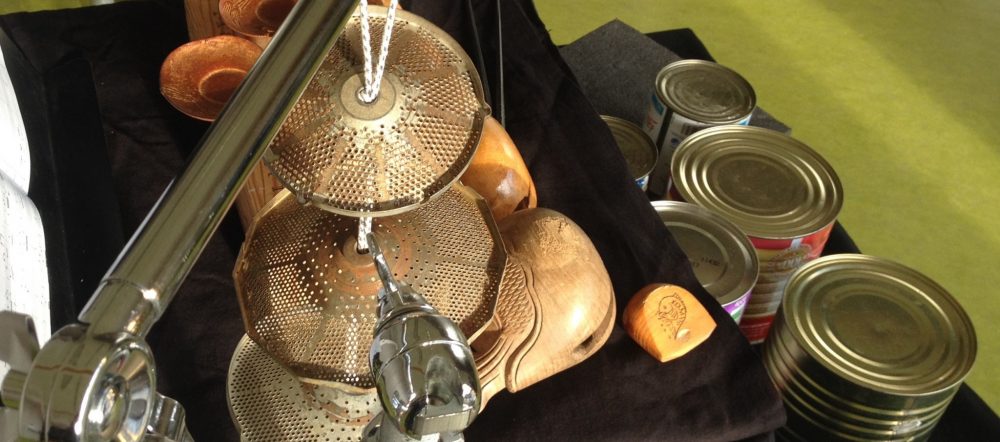Summary
About sound bodies
Abril Padilla, composer: A musical instrument is a sound body that has been made to produce certain sounds and involve specific gestures. It has a specific name, it has a history, it was designed by a factor or manufacturer and belongs to a directory. But what is a sound body?
While the term comes from the field of acoustics, current use of the term “sound body” is attributed to Pierre Schaeffer from 1950’s, in order to differentiating the material object used as a sound source from the concept of a sound object and musical object, fixed on a support (a disc, a magnetic tape). While the name “sound objects” has spread to many areas, far beyond concrete music, the concept of the sound body remains very attached to it. In the fields of experimental improvised music and percussion, we shall come across the designation “accessory” when talking about sound bodies.
Since a sound body can be anything played that produces a sound that catches the attention, it would be impossible to make a list. It would be endless! Examples are integrated in the modules, according to a specific context and proposal.
Since the creation of CFMI in France, the term sound body has associations of musical invention. This does not exclude the use of manufactured instruments, the term simply widens the range of possibilities to various objects, but not derived from any violin.
Exploring what happens when a child comes across every day objects. The sound exploration tends to find modes of play and to involve modes of listening oneself, then others.
It can have different amounts of freedom depending on the ages of the children, their degree of autonomy, the constraints of the sound body or instrument played and the available space.
Duration: about 5 min per exercise
Age: from age 6
Key words creativity and entrepreneurship: Exploration, Imagination, Enthusiasm, Working in teams, Interaction with the environment
Description
Sound body exploration: to adventure
To explore is to adventure into the unknown. But it is possible to be equipped with compasses and know the landmarks! For example, it is possible to decide when the exploration will end, its length, its objectives.The teacher asks for creativity through variation, focusing on the gesture, with the idea of ”playing differently” through listening that is to say, by looking for a “new sound”.
Advice:
These are moments of exploration or games to be played, without speaking.
Just removing speech during a short moment of exploration or play, allows the sounds to be heard more precisely and can lead to music.
Examples of exploration of different modes of play on different sound bodies
Explore by all possible means imaginable, the sound potential of the sound body chosen.
Introduce the group to the sound that has been found.
The group reproduces this sound by paying attention to the instrumental gesture.
Competencies
The pupils are able to:
- explore;
- choose;
- propose.
Rebel game:
A student proposes a sound. This sound is reproduced by all. Then another student suddenly launches another sound always with the same sound body but with a different mode of play. Students join in gradually and so on.
Everything is done without designation, without speaking, without pointing out. A rebel is one who imposes himself when he wishes and as he decides and the others are attentive to change and appropriate another mode of play.
Competencies
The pupils are able to:
- pay attention;
- listen;
- imitate;
- be adaptable;
- impose itself.
From exploration to Performance
Competencies
The pupils are able to:
- explore;
- choose;
- propose;
- pay attention;
- imitate;
- be adaptable;
- impose itself.
References
- Corps sonores
- CREAMUS : ressources audiovisuelles sélectionnées du fonds GRM, des dossiers pédagogiques thématiques et une invitation à partager ses pratiques pédagogiques
- Wikipédia Musique concrète (en plusieurs langues)
- Les chaussures comme corps sonore : Pas de cinq de Mauricio Kagel
- Composition pour fouet de cuisine et ensemble : Emulsion de Abril Padilla
- Composition pour cannettes et Kway : Hirn & Ei de Carola Bauckholt
Module Overview
|
